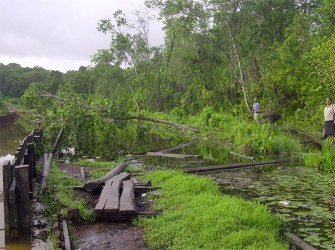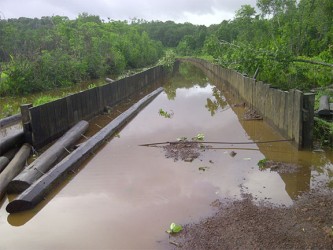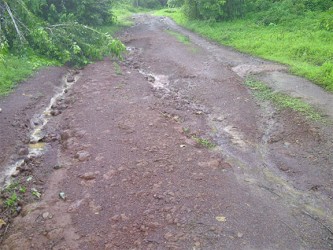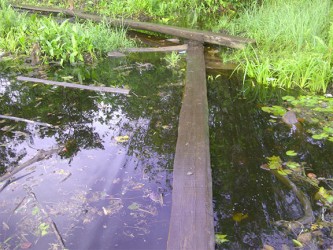By Mario Joseph
A $21.3 million road project started in January 2013 in Barabina, Region One, has been stalled for about two months forcing residents to use a boat to cross a section of the flooded pathway but Minister of Public Works Robeson Benn says that the road can be used during the low tide.
Members of the Community Development Council, along with residents, in a collective interview with Stabroek News during a visit to the community recently, said that works on the road began in 2011 under the control of the Regional Democratic Council (RDC) but was handed over to the Ministry of Public Works in 2012. The group said that the new contractor two months ago, told them that the money to build the road had been exhausted and abandoned the project.
However, Benn in an interview with Stabroek News, said that community and contractor issues caused the project to be interrupted while there were material supply and weather issues as well. He indicated that the roadway can be used when there isn’t a high tide and chided the complainants because he said, prior to March, the residents could not access Barabina the way they can now. “It was never the intention of the Ministry of Public Works to have interior roads capable of using small cars with little ground clearance,” Benn added. “People with those little cars, get upset easily because every little pothole hits their car bottom,” he asserted.

During Stabroek News’ visit to the community on July 8, sections of the road were submerged in approximately three feet of water. Residents, with the help of a generous donor whom they identified as Joy Ramkissoon, had laid a wooded pathway alongside the submerged road. Walking across was no easy task, as this reporter experienced. One has to be very careful and consider each step along the way lest one falls into the swamp below.
A small paddle boat was noticed at the other end of the road, and residents said that it was given to them a week or two ago prior by the RDC to help them cross the flooded road.
The complaints made by the community members were dire. Some shared personal experiences of having to walk across the estimated 100 metres of swamp where snakes and alligators lurked. One woman said that one night as she was returning home, she had to take off her work skirt because she needed to wear it the following day as it would have otherwise gotten wet by the water which was waist high. Residents said that they have been incurring high costs to travel to and from home with taxis charging $1000 to $2000 to bring them up to the submerged road because the entire journey into the community is on a treacherous, deteriorated road.
One shopkeeper complained about the added cost that she has to bear when bringing in goods for her store. She said that sometimes the items are ruined when they fall into the water that has engulfed the abandoned road. Another individual said that she started constructing her home just prior to the road works and cried out because she had to pay several labourers to manually fetch each concrete block, steel rod and wood required to build her home. Residents said that when someone falls ill, they have to place the person in a hammock then fetch the person down the hill, across the slippery slope.
Referring to the Regional Administration, they said, “Those men in charge rarely come to visit.” Regional Executive Officer Nigel Fisher has never come to see the problems they are facing, residents added. “They tell us they can’t do anything when we go to them because the contract was awarded by the Ministry of Public Works. They are our leaders and they are the ones that are supposed to be addressing this problem but they’re doing nothing,” one resident said. “Ten years now they promised us electricity, they even bought the poles but all went to waste because they couldn’t bring in the machinery to drive them into the ground and set everything up because of that very road,” another added.
Meantime, acknowledging the state of disrepair of most of the roads in the Mabaruma sub-region, Benn said: “People can say that back then the roads were good but they fail to realise that back then, there weren’t many vehicles on the road and today because of all those cars and trucks, the road is taking a beating.”

In relation to the issue of using laterite which residents charge as being inferior, rather than granite which they said should be used instead, Benn asserted that it simply is not feasible. Granite has risen in price by 30% to 40% over the past year and it is not economic to import it into the region, the minister said. He further mentioned that laterite is used for most rural roads including the Lethem road and stated that it is good enough for the community.
Regarding the road project, Benn admitted that the contractor, Joshi Construction and Transportation Establishment, has not performed well. He was keen to point though that this company is the only one operating in that area. He added that it would cost $6 million just to get equipment into the region for his ministry to do the work and this is not feasible.
The ministry’s hinterland engineer Naeem Mohamed, who was with Benn during the interview, said that the project is approximately 70% complete and payment has been disbursed according to the level of completion and quality of work done. He related that the road project was first tendered sometime in 2012 but no one responded. It was retendered in December of the same year and Joshi was the only bidder. After awarding the contract and paying approximately 30% of the overall cost to facilitate mobilization, works commenced in January last year, Mohamed said.
He recounted that the project suffered intermittent delays that consumed an aggregate of four months due to several reasons. From March to June 2013, the contractor faced some difficulty in acquiring lumber due to some workers’ wage dispute, he said. Subsequently, the Inspector of Works rejected the first set of wood that the contractor managed to acquire because it was not of the best quality.
“We gave him some time to get proper wood to do the revetment, with a list of acceptable types like Greenheart, Bullet(wood), Mora, etc,” Mohamed added. “Heavy torrential rainfall during the period further caused delays,” he said too. Adding to the delays was the difficulty in excavating and driving piles because of debris in the soil, he said. Finally, Mohamed said, the ministry had to build a $3 million bridge that leads to the road so that the excavator could reach the construction site.

Mohamed also acknowledged that the contractor did not perform well and said that the last bit of work done on the project was about one month ago. He said that the residents were paid to pack laterite on the road to strengthen the foundation and all that is left to be done is for the contractor to go back and do some additional filling after which he would have to complete the corduroy work which should take about two weeks. Asked when the contractor would resume work, Mohamed said that this would be done in about a week’s time.





